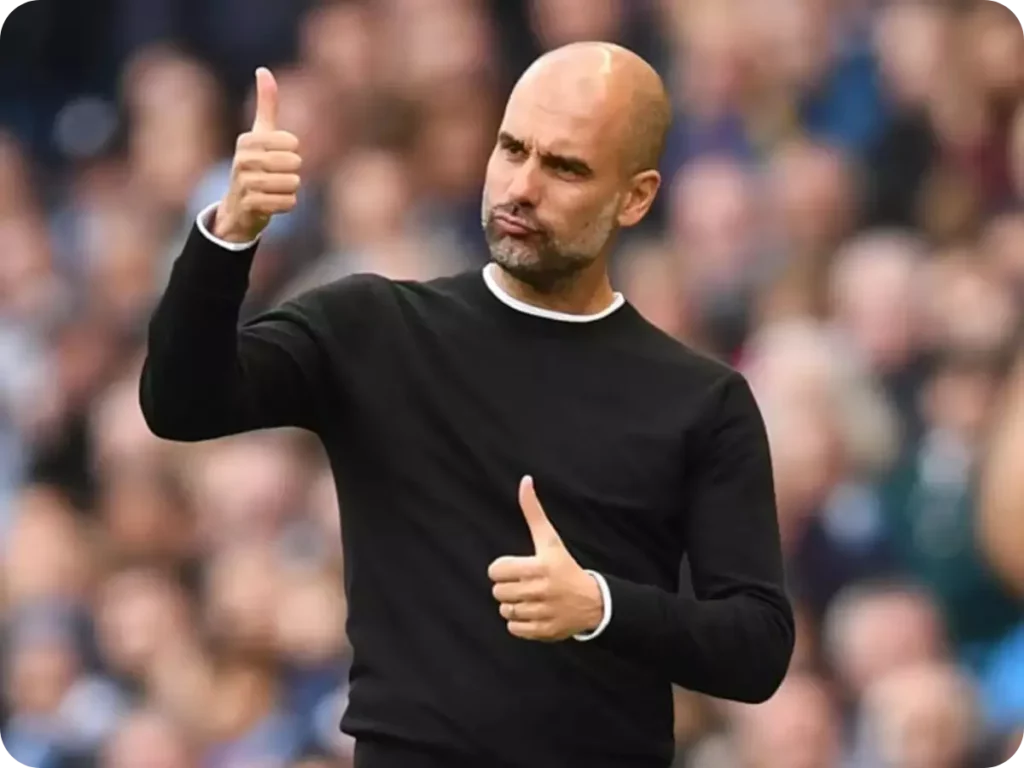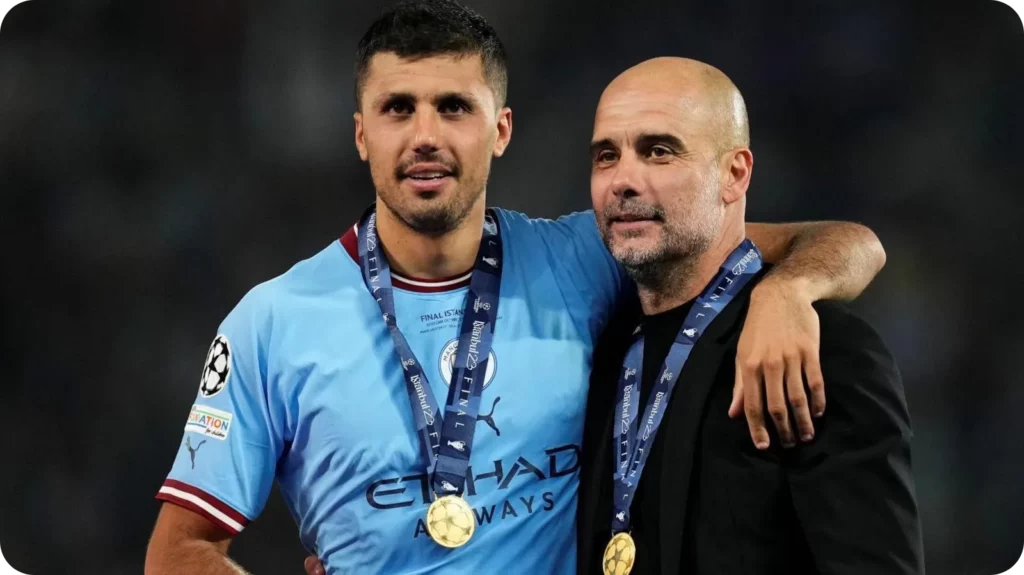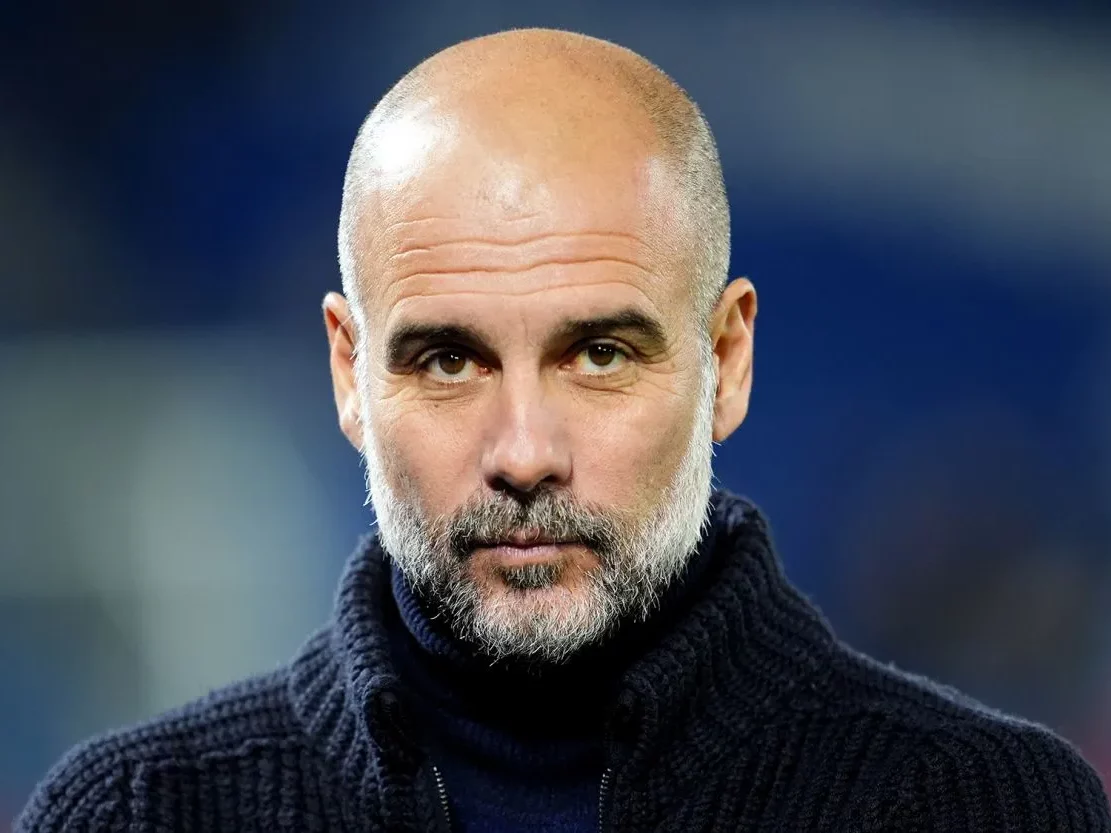- Career, Stats, and Transfer News
- Leadership, Business & Influence
- Tactical Strategy & Football Philosoph
- Tactics, Achievements & Legacy

Career, Stats, and Transfer News

Leadership, Business & Influence

Tactical Strategy & Football Philosoph

Tactics, Achievements & Legacy
Early Life and Playing Days
Growing Up in Spain and La Masia Academy
Pep Guardiola was born on January 18, 1971, in Santpedor, a small town near Barcelona. His passion for “the beautiful game” emerged at a very young age, as his formative years were profoundly influenced by the local football culture that surrounded him from a tender age. Being just a boy, Guardiola exhibited natural ball-playing abilities, quickly joining youth sides in the vicinity. However, it was not long before his immense soccer talents caught the discerning eye of the prestigious La Masia academy, the venerable youth system of Barcelona renowned worldwide for cultivating some of football’s greatest icons. La Masia would play an indispensable role in sculpting both Guardiola’s skills on the pitch and his character off it.
Guardiola’s formative years within the hallowed halls of La Masia equipped him with the tactical nuances and unmatched technical prowess necessary to thrive at the highest echelons. The revered academy placed a strong emphasis on nurturing players’ technique, rapid decision-making, and tactical awareness – laying the foundation for Guardiola’s future career in management. It was during this illuminating period that he refined his philosophy of the beautiful game, learning not just the physical aspects but also how to scan the field perceptively, foresee teammates’ movements intuitively, and dictate the tempo authoritatively. This illuminating duration also cemented Guardiola’s deep affinity with Barcelona, a bond that would come to fundamentally define his professional journey going forward.

Breakthrough at Barcelona and Role as a Midfielder
Guardiola debuted for FC Barcelona’s B team in 1990 before Cruyff promoted him to the first team. Under the legendary coach’s tutelage, Guardiola rapidly assimilated Barcelona’s philosophies prioritizing possession, fluidity, and attacking through control.
As a midfielder, Guardiola’s intelligence shone through. His razor-sharp, pinpoint passing and deft technical artistry permitted him to dictate the ebb and flow, spotting opportunities others overlooked. Meanwhile, short, cutting passes maintained possession for teammates. Anchoring Barcelona’s midfield with consistency, Guardiola drove domestic success and international glory.
Defined by ice under pressure and spatial prescience, Guardiola dismantled opposition attacks while advancing forward. His leadership on the pitch emerged as the conducting maestro orchestrating Barcelona’s offensive symphonies. During his tenure, accumulated honors including La Liga and Champions League championships cemented Guardiola’s place among football’s most splendid midfielders throughout history.

Stints at Brescia, Roma, and Late Career Moves
After over a decade dominating the midfield at Barcelona, Pep Guardiola’s illustrious playing career was taking him into uncharted areas of Italy, where he joined the modest yet ambitious project underway at Brescia in 2001. While his impact on that blossoming squad stayed profound, Guardiola found that his time on the pitch had become scarce. Craving a new challenge, his next move was to the majestic giant that is Roma, but he lasted only briefly before returning to Spain for a swansong in the far eastern region of Qatar with Al-Ahli.
During these later phases of his career, Guardiola’s roles changed from directing play with the ball to guiding his teammates from the sidelines and offering advice. Though the shine of top tier European competition had faded, the unique knowledge and wisdom he imparted proved to be extremely valuable for his clubs. Guardiola gained invaluable insights into the nuances of foreign cultures and styles of play, lessons that would serve him tremendously in his second act as a coach navigating systems beyond Barcelona’s legendary ways, as he experimented with implementing new tactics and manoeuvres that challenged his players in varied fashions.
Representing Spain on the International Stage
Guardiola’s career representing Spain, though commendable, was less renowned than his club feats. While earning forty-seven caps for La Roja and appearing in prestigious tournaments like the 1994 FIFA World Cup and UEFA Euro 1996, his performances at the international level paled in comparison to his midfield mastery displayed for Barcelona. Mainly due to the overflowing pool of talent competing for spots on the legendary Spanish squads from the 1990s through the early 2000s, Guardiola failed to achieve the same level of acclaim with his national team as he did at club level.
Despite not taking home any major honors alongside Spain, Guardiola’s impact proved to run far deeper. His experiences at Barça and keen tactical thinking made him an invaluable asset for La Furia Roja, helping to cultivate the foundations upon which Spain would construct a revolution in football culminating in UEFA Euro 2008, the 2010 FIFA World Cup, and UEFA Euro 2012. Though trophies did not follow, Guardiola’s influence on Spain’s national team played an integral role in shaping their era of worldwide footballing dominance.
Pathway to Coaching
Retirement and Passion for Tactical Analysis
After ending his illustrious playing career in 2012, Guardiola wasted little time in transitioning fully to the world of management. Having always been intellectually curious about the strategic nuances of the game, his passion for dissecting football systems and schemes was patent even during his playing days. Retirement allowed him to immerse himself completely in comprehending the intricate subtleties of tactical design, and he evolved into a student of the beautiful game in its purest form.
Guardiola’s analytic approach to the sport was molded under the tutelage of Johan Cruyff at Barcelona, who played an instrumental role in cultivating the philosophical vision that would define Guardiola’s professional path. In his new chapter without the physical demands of being a player, Guardiola embarked on reflecting deeply on his experiences, voraciously consuming literature about strategical innovation, and examining the methodologies of top coaches across Europe with intense interest.

Mentorship Under Johan Cruyff and Coaching Philosophy
Guardiola’s coaching acumen was intensely shaped by his bond with Johan Cruyff, who served not merely as his coach at Barcelona but additionally a guide and ideological pillar. Cruyff’s pioneering vision for football, notably the focus on possession, pressing, and positional fluidity, left an indelible imprint on Guardiola’s own way of coaching. Under Cruyff’s counsel, Guardiola gained insight to perceive football through a tactical perspective that emphasized intelligence, adaptable movement, and collective synchronization over singular brilliance.
The tenets of Cruyff’s “Total Football” scheme became the foundation of Guardiola’s managerial approach, especially his emphasis on controlling the play, vigilant pressing, and players’ situational roles. Guardiola’s methodology to coaching would proceed to mold the prosperity of his administrative career, guiding to a golden age at Barcelona and beyond.
Managing Barcelona B and Stepping into the First Team
Guardiola’s journey into management started humbly with Barcelona’s B team, where he refined his coaching skills and philosophy. His time with the reserves was fundamental in shaping his understanding of developing youth. Guardiola had proven his worth with the juniors at Barcelona, adequately preparing him to eventually steer the senior side.
In 2008, the board at Barcelona appointed Guardiola as the new first team head coach, replacing Frank Rijkaard. Naturally progressing up from Barcelona B, Guardiola had exhibited tactical mastery and the ability to optimize players. Taking charge of the iconic Catalan club marked the inception of one of soccer’s most gloried managerial careers in contemporary times, transforming Barcelona into arguably the finest team of their generation.
Managerial Triumphs Across Europe

Barcelona’s Golden Era – Tiki-Taka and Unmatched Success
Guardiola’s time as Barcelona’s manager was nothing short of legendary. Under his leadership, the team achieved unprecedented success both domestically and internationally. Guardiola’s Barcelona was defined by their possession-based system known as tiki-taka which emphasized quick, short passes between players who moved fluidly together in perfect coordination.
During his tenure at the club, Barcelona dominated by winning numerous La Liga championships and Copa del Rey trophies while also capturing two UEFA Champions League titles. The team became renowned for their tactical adaptability, technical mastery on the ball, and focus on maintaining possession. Stars like Lionel Messi, Xavi, and Andrés Iniesta excelled under Guardiola’s guidance combining to form one of football’s most dominant dynasties in history.
Guardiola’s Barcelona revolutionized the modern game as we know it, and his impact continues to influence coaches and teams around the globe to this day. The phenomenal achievements realized during his time at the club set the gold standard which others around the world aspire and are measured against.
Bayern Munich Years – Bundesliga Dominance and Tactical Growth
After departing from Barcelona in 2012, Guardiola embraced the challenge of guiding Bayern Munich, one of Germany’s most accomplished clubs. His tenure at Bayern was defined by supremacy in the Bundesliga, where he led the team to several consecutive league championships. Guardiola tailored his approach at Bayern somewhat differently than at Barcelona, adapting his philosophy to maximize the abilities and minimize the deficiencies of his new squad.
While guiding Bayern, Guardiola continued refining his tactical schemes, incorporating more flexible formations and customizing his high-pressure system to play to the German side’s strengths. Though Bayern prevailed in many domestic titles under his leadership, they were unable to capture the Champions League trophy during his time with the club, an inadequacy often listed as a failing in an otherwise hugely successful period.
Manchester City – Transforming the Club into an Elite Powerhouse
Guardiola’s arrival at Manchester City began a period of unprecedented dominance within England and abroad. Taking the managerial reigns in 2016, he transformed the Sky Blues into a tactical juggernaut, employing an offensive-minded system built around aggressive pressing and endless possession. His innovative strategies produced staggering results, toppling record after record in the Premier League while establishing City as a continental heavyweight. Under Guardiola’s stewardship, the club flourished like never before, maximizing their potential through his groundbreaking methods. Multiple league championships, both domestic and European success, all point to the Spaniard’s unparalleled impact. Years on, Manchester City remain a model of modern football thanks to Guardiola’s unrivaled vision – his philosophical revolution that pushed the boundaries of what can be achieved on the highest level.
Tactical Genius and Football Innovations
High-Pressing, Possession-Based Football and Flexibility
One of Guardiola’s most defining traits as a manager is his strategic flexibility. Although his sides are renowned for keeping possession, he also stresses aggressive defending and each player fulfilling their designated role. His teams compete with a ferocity that guarantees reclaiming the ball rapidly after relinquishing it, while continuing to control proceedings through intricate passing interchanges and off-ball movement.
Guardiola’s groundbreaking tactics have made him among soccer’s most revered coaches, with numerous others hoping to emulate his achievements. His methodology focuses not merely on attacking but also on being defensively sound, confirming that his sides stay compact and tough to break down. Players function as a cohesive unit, quick to shift formation when needed to stifle the opposition. Inspired by his example, coaches worldwide now emphasize cerebral, possession-based football demanding perfection in both technique and decision-making from their charges.

Evolution of Modern Midfield Play and Tactical Adaptations
Guardiola’s influence on midfield play was truly groundbreaking. His sides relied tremendously on the engine room to dominate proceedings, with maestros such as Xavi, Andres Iniesta, Kevin De Bruyne, and Sergio Busquets being fundamental in implementing his strategic schemes. Guardiola’s focus on controlling the rhythm of contests through the midfield established a novel norm for contemporary football — a level of control and precision reminiscent of how gambling traffic is managed to maximize engagement and result
Guardiola has also tailored his tactics over time, evolving his methodology to meet the demands of the squads he steers. Whether it’s tweaking his formation or modifying his pressing mechanics, Guardiola’s faculty to acclimatize to divergent hurdles has been a pivotal factor in his success.
Guardiola’s Lasting Impact on Global Football
Pep Guardiola’s impact on football extends past the titles and trophies he has won. His philosophy of possession, aggressive pressing, and tactical intellect has influenced mentors and players worldwide. From his time at Barcelona to his current stint at Manchester City, Guardiola’s legacy has been one of innovation and excellence, forever changing the landscape of modern football.
Achievements and Records

Major Titles in Spain, Germany, and England
Over the span of his storied managerial career, Pep Guardiola has amassed an extraordinarily successful collection of championships in three of football’s premier divisions. His triumphs guiding Barcelona, Bayern Munich, and Manchester City have seen numerous domestic league titles, cup trophies, and Champions League victories added to his impressive resume, with his indelible influence felt throughout each club.
Champions League Campaigns and European Challenges
Guardiola’s relentless pursuit of Champions League supremacy stands as one of the quintessential storylines of his career. While twice achieving the prestigious European crown as Barcelona’s manager, his efforts to secure the trophy leading Bayern Munich and Manchester City have imbued his illustrious legacy with added layers of complexity. Each Champions League campaign has provided valuable experience and keen insights into conquering the immense obstacles required to achieve continental dominance.
Individual Honors and Historic Managerial Milestones
Guardiola’s achievements are not solely reflected in the championships he has won but also in the personal honors he has attained. As one of the most successful and influential football bosses ever, Guardiola has earned numerous Coach of the Year awards and has been recognized for his contribution to the sport. His innovative tactics and exceptional man-management have completely transformed not only the teams he has led but footballing philosophy on a global scale.
Future Prospects and Legacy
Will Guardiola Explore a New Challenge or National Team Role?
Looking ahead, many speculate on what comes next for Pep Guardiola. While his tenure at Manchester City continues to thrive, there has been debate around whether he will take on a entirely new task or potentially take up a role with a national side. His legacy as one of the greatest football minds in history is cemented, but his subsequent move stays unknown.
